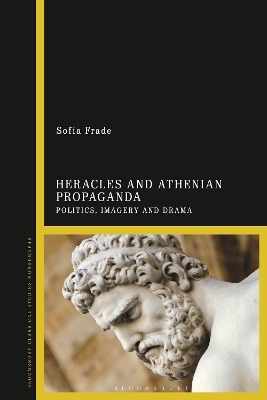
Heracles and Athenian Propaganda
Politics, Imagery and Drama
Seiten
2024
Bloomsbury Academic (Verlag)
978-1-350-37067-8 (ISBN)
Bloomsbury Academic (Verlag)
978-1-350-37067-8 (ISBN)
Heracles and Athenian Propaganda examines how Greece's most important hero was appropriated and portrayed by Athens in religion, politics, architecture and literature, with a detailed study of Euripides' Heracles in relation to this interplay between the hero and the city's ideology. Though Athens needed a hero of Hellenic stature, Heracles was a deeply problematic figure: a violent hero of ancient epic, with an aristocratic nature and a murderous temper, who did not naturally fit into the new ideals of democratic society at Athens.
Examining how Euripides' play fits within the space of the polis and its political ideology, Sofia Frade asks specific questions of tragedy and politics: how does Euripides' tragic drama of grief, insanity and murder reconcile this hero to a palatable, patriotic ideal? How does the tragic hero relate to his own representations and his cult within the polis? In a city so marked by iconographic propaganda, how did the imagery influence the audience?
By looking at the play's larger contexts – literary, civic, political, religious and ideological – new readings are offered to the most problematic elements of the play, including the question of its unity, the nature of the hero's madness and the role of the gods.
Examining how Euripides' play fits within the space of the polis and its political ideology, Sofia Frade asks specific questions of tragedy and politics: how does Euripides' tragic drama of grief, insanity and murder reconcile this hero to a palatable, patriotic ideal? How does the tragic hero relate to his own representations and his cult within the polis? In a city so marked by iconographic propaganda, how did the imagery influence the audience?
By looking at the play's larger contexts – literary, civic, political, religious and ideological – new readings are offered to the most problematic elements of the play, including the question of its unity, the nature of the hero's madness and the role of the gods.
Sofia Frade is Assistant Professor in Classics at the University of Lisbon, Portugal.
1. Introduction
2. Propaganda and Politics Athens
3. Transforming the Hero: Heracles and Athenian Ideology
4. Forsaking the tripod: Heracles in Athenian Architecture
5. Crossing Boundaries: What is it to be a hero?
6. Into Athens: old gods and new gods
7. Conclusion
Notes
Bibliography
Index
| Erscheinungsdatum | 17.07.2023 |
|---|---|
| Verlagsort | London |
| Sprache | englisch |
| Maße | 156 x 234 mm |
| Themenwelt | Literatur ► Klassiker / Moderne Klassiker |
| Geschichte ► Allgemeine Geschichte ► Vor- und Frühgeschichte | |
| Geschichte ► Allgemeine Geschichte ► Altertum / Antike | |
| Geisteswissenschaften ► Geschichte ► Regional- / Ländergeschichte | |
| Geisteswissenschaften ► Sprach- / Literaturwissenschaft ► Anglistik / Amerikanistik | |
| Geisteswissenschaften ► Sprach- / Literaturwissenschaft ► Literaturwissenschaft | |
| Sozialwissenschaften ► Soziologie | |
| ISBN-10 | 1-350-37067-3 / 1350370673 |
| ISBN-13 | 978-1-350-37067-8 / 9781350370678 |
| Zustand | Neuware |
| Informationen gemäß Produktsicherheitsverordnung (GPSR) | |
| Haben Sie eine Frage zum Produkt? |
Mehr entdecken
aus dem Bereich
aus dem Bereich
auf den Spuren der frühen Zivilisationen
Buch | Hardcover (2023)
C.H.Beck (Verlag)
20,00 €
Konzepte – Methoden – Theorien
Buch | Softcover (2024)
UTB (Verlag)
39,90 €
Was Pompeji über uns erzählt
Buch | Hardcover (2023)
Propyläen (Verlag)
32,00 €


